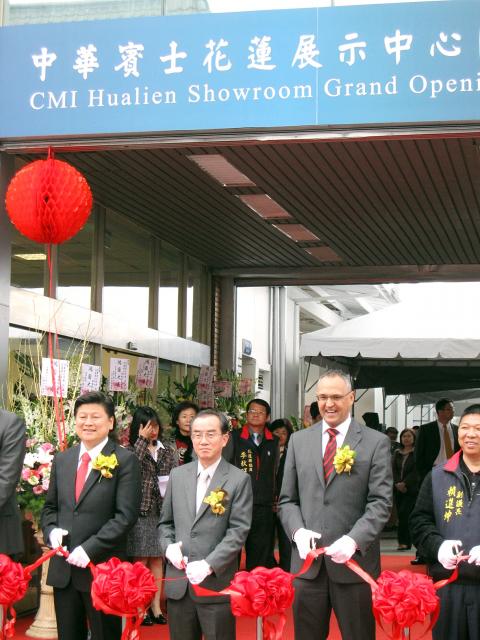Luxury goods makers, including those in the home furnishings and auto businesses, yesterday said the proposed luxury tax “would not have much impact” on sales because their customers are seeking top-quality goods and could afford to pay a little extra.
That contradicts concerns raised by the European Chamber of Commerce Taipei (ECCT) that the tax could hurt car sales.
“Some clients are spending as much as NT$10 million [US$300,000] furnishing their homes. They will not frown on the extra tax,” said David Hsu (徐培庭), marketing director at New World Design Center (紐約家具設計中心).

Photo: Yang Ya-min, Taipei Times
“These customers do not only buy one piece of furniture; they are purchasing many pieces at the same time. That comes out at many zeros [in dollar terms],” he said by phone.
New World Design promotes itself as an operator of top-class furniture malls.
In December, the firm launched a new five-story mall in Neihu, Taipei, that spans 7,000 ping (23,100m2). That complements its three other malls — two in Sinchuang, New Taipei City (新北市), and another in Taichung.
The Neihu mall’s goal is to earn NT$1.4 billion in sales for the first year and that remains intact, Hsu added.
The Ministry of Finance has announced plans to impose a 10 percent luxury tax on the sale of certain expensive goods and services — such as home furnishings that cost NT$500,000 or more, as well as private jets, yachts and cars with a price tag of at least NT$3 million — starting in July at the earliest.
On Wednesday, the ECCT expressed concern over the imposition of a luxury tax on European vehicle importers during an hour-long meeting with Minister of Finance Lee Sush-der (李述德), Central News Agency (CNA) reported, citing ECCT chief executive Freddie Hoeglund and chairman Chris James.
CNA quoted an official at the ministry saying that 3,500 such vehicles were purchased last year and if the tax were imposed, the nation’s tax revenues would be boosted by an additional NT$1.5 billion.
However, the impact could be wider than the ministry’s estimates.
Automakers said that among the 32,000 high-end imported vehicles sold last year, 40 percent — or 13,000 units — were priced at NT$3 million or more.
Mercedes-Benz and BMW would take the biggest hit, said an official from Hotai Motor Co (和泰汽車) who wished to remain anonymous.
Hotai distributes the high-end Lexus models and it sold more than 6,000 cars last year, 500 of them from the LS series — the only model that carries a price tag of more than NT$3 million.
“The impact isn’t that huge to us, but consumer confidence will take a hit. They will wonder why on earth they have to shoulder the extra 10 percent,” he said.

MULTIFACETED: A task force has analyzed possible scenarios and created responses to assist domestic industries in dealing with US tariffs, the economics minister said The Executive Yuan is tomorrow to announce countermeasures to US President Donald Trump’s planned reciprocal tariffs, although the details of the plan would not be made public until Monday next week, Minister of Economic Affairs J.W. Kuo (郭智輝) said yesterday. The Cabinet established an economic and trade task force in November last year to deal with US trade and tariff related issues, Kuo told reporters outside the legislature in Taipei. The task force has been analyzing and evaluating all kinds of scenarios to identify suitable responses and determine how best to assist domestic industries in managing the effects of Trump’s tariffs, he

TIGHT-LIPPED: UMC said it had no merger plans at the moment, after Nikkei Asia reported that the firm and GlobalFoundries were considering restarting merger talks United Microelectronics Corp (UMC, 聯電), the world’s No. 4 contract chipmaker, yesterday launched a new US$5 billion 12-inch chip factory in Singapore as part of its latest effort to diversify its manufacturing footprint amid growing geopolitical risks. The new factory, adjacent to UMC’s existing Singapore fab in the Pasir Res Wafer Fab Park, is scheduled to enter volume production next year, utilizing mature 22-nanometer and 28-nanometer process technologies, UMC said in a statement. The company plans to invest US$5 billion during the first phase of the new fab, which would have an installed capacity of 30,000 12-inch wafers per month, it said. The

Taiwan’s official purchasing managers’ index (PMI) last month rose 0.2 percentage points to 54.2, in a second consecutive month of expansion, thanks to front-loading demand intended to avoid potential US tariff hikes, the Chung-Hua Institution for Economic Research (CIER, 中華經濟研究院) said yesterday. While short-term demand appeared robust, uncertainties rose due to US President Donald Trump’s unpredictable trade policy, CIER president Lien Hsien-ming (連賢明) told a news conference in Taipei. Taiwan’s economy this year would be characterized by high-level fluctuations and the volatility would be wilder than most expect, Lien said Demand for electronics, particularly semiconductors, continues to benefit from US technology giants’ effort

‘SWASTICAR’: Tesla CEO Elon Musk’s close association with Donald Trump has prompted opponents to brand him a ‘Nazi’ and resulted in a dramatic drop in sales Demonstrators descended on Tesla Inc dealerships across the US, and in Europe and Canada on Saturday to protest company chief Elon Musk, who has amassed extraordinary power as a top adviser to US President Donald Trump. Waving signs with messages such as “Musk is stealing our money” and “Reclaim our country,” the protests largely took place peacefully following fiery episodes of vandalism on Tesla vehicles, dealerships and other facilities in recent weeks that US officials have denounced as terrorism. Hundreds rallied on Saturday outside the Tesla dealership in Manhattan. Some blasted Musk, the world’s richest man, while others demanded the shuttering of his